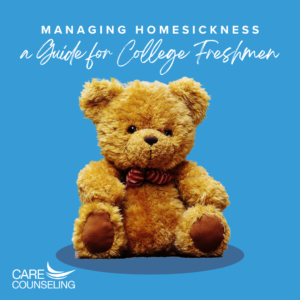Managing Homesickness: A Guide for College Freshmen
 Starting college is an exciting adventure filled with new experiences, opportunities, and challenges. However, for many college freshmen, the transition from the comforts of home to a new living environment can bring about feelings of homesickness. Homesickness is a natural and common emotion, but it’s essential to learn how to manage it effectively to ensure a smoother adjustment to your college life.
Starting college is an exciting adventure filled with new experiences, opportunities, and challenges. However, for many college freshmen, the transition from the comforts of home to a new living environment can bring about feelings of homesickness. Homesickness is a natural and common emotion, but it’s essential to learn how to manage it effectively to ensure a smoother adjustment to your college life.
Understanding Homesickness
Homesickness is not uncommon, and it’s essential to recognize that you’re not alone in experiencing these emotions. Leaving behind the familiarity of your hometown, family, and friends can lead to feelings of sadness, loneliness, and longing. It’s important to acknowledge these emotions rather than dismiss them, as doing so is the first step toward managing homesickness.
Embrace Your New Environment
While it’s natural to miss your old routines and surroundings, it’s equally important to embrace your new environment. Get to know your college campus, explore nearby areas, and engage in activities that interest you. Familiarizing yourself with your surroundings can help create a sense of belonging and make your new living space feel more like home.
Stay Connected with Loved Ones
Even though you’re away from home, staying connected with your loved ones can provide comfort and support. Thanks to modern technology, you can video chat, call, or message your family and friends whenever you feel the need to connect. Sharing updates about your college life and hearing about their experiences can bridge the gap between your old and new worlds.
Create a Home Away from Home
Personalizing your living space can greatly impact how you feel about your new environment. Decorate your dorm room or apartment with items that remind you of home, such as photos, posters, or even familiar scents. Surrounding yourself with these familiar elements can help alleviate feelings of homesickness.
Establish New Routines
One of the reasons homesickness can intensify is the lack of structure and routine in your new life. To combat this, create a schedule that encompasses your classes, study time, social activities, and personal time. A structured routine not only keeps you busy but also gives you a sense of control and purpose, which can significantly reduce feelings of homesickness.
Engage in Campus Activities
Participating in campus activities and joining clubs or organizations is an excellent way to meet new people who share your interests. Engaging in these activities can help you forge new friendships, build a sense of community, and distract you from thoughts of home. The more involved you become on campus, the more connected you’ll feel to your new college life.
Explore Your Surroundings
Venturing beyond campus and exploring your new city or town can help you discover exciting places and experiences. Visit local cafes, parks, museums, and other attractions to create new memories and associations with your new environment. As you become more familiar with the area, your sense of homesickness may gradually diminish.
Reach Out for Support
Remember that seeking support is a sign of strength, not weakness. Most colleges offer counseling services for students who are struggling with various challenges, including homesickness. Speaking to a counselor can provide you with coping strategies, a safe space to express your feelings, and valuable insights on managing your emotions.
Stay Positive and Patient
Managing homesickness takes time and effort. Be patient with yourself and recognize that the adjustment process is a gradual one. Celebrate the small victories and moments of joy as you become more comfortable in your new living environment.
Dealing with homesickness as a college freshman is a natural part of the transition to higher education. By embracing your new environment, staying connected with loved ones, creating a comfortable living space, and engaging in campus activities, you can effectively manage homesickness and make the most of your college experience. Remember that you have the resilience to overcome these challenges and create a fulfilling and memorable journey throughout your college years.



























